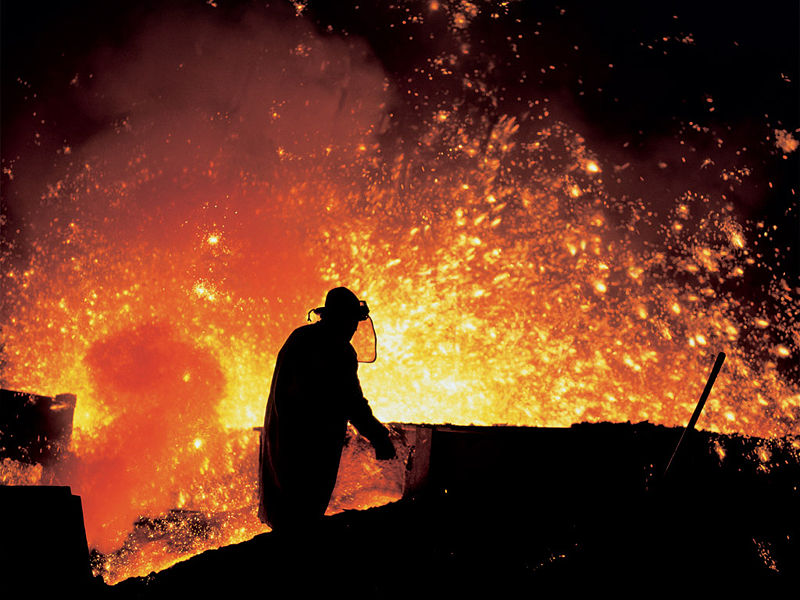Officials in Tehran are busy trying to secure international trade deals ahead of an expected first wave of American sanctions, but Kazakhstan’s steel giant ArcelorMittal Temirtau has not been convinced they are worth the risk.
“Supplies to Iran will be temporarily suspended due to the sanctions. Once sanctions are lifted, the supplies will be resumed,” Alexey Agureev, Communication and Public Relations Adviser for ArcelorMittal Temirtau, told Kazinform on July 18. ArcelorMittal Temirtau is a manufacturer of hot-rolled steel coils and normally exports to Iran.
Kazakhstan is not expected to suffer economically in anyway, however, having redirected its exports to Russia, which has provided Kazakhstan with special benefits for steel supplies. In 2017, Kazakhstani steelmakers provided their northern neighbor with almost 600,000 tons of steel, or 90 percent more than the year before.
Meanwhile, the Iranian steel market is no longer of interest to Russia, where major steelmakers – Severstal, and Magnitogorsk Iron and Steel Works – have already reoriented their supply and export chains to more Southeast Asia, Vietnam and Pakistan.
According to reports in Tehran Times, Iran produces 34 million tons of steel per year and exports about 9 million tons of that amount. Iran’s net hot-rolled steel coil consumption was 5.6 million tons in 2017, of which 0.8 million tons were imported, according to CRU Group, a leading provider of analysis, prices and consulting in the mining, metals and fertilizer markets.
While Russia supplied a total of 410,000 tons to Iran in 2017, another 240,000 tons were shipped from Kazakhstan. These supplies mostly consisted of hot-rolled coil less than two millimeters thick, which was not able to be produced in Iran at the time.
Iran’s Mobarakeh Steel Company announced in June that it intends to help soften the blow of U.S. sanctions by launching domestic production of hot-rolled steel coils.
“Thus, an imposition of trade barriers (both Iran import tariffs and U.S. sanctions), alongside fresh domestic production in Iran, is likely to result in a sharp reduction in [hot rolled] coil imports from the CIS nations,” Puneet Paliwal, a senior analyst with CRU, said, according to reports by Reuters.
Iran has been under U.S. sanctions since the Iranian Revolution in 1979. While sanctions initially stemmed from retaliation for Iranian students seizing the U.S. embassy and taking Americans hostage for more than a year, Iran’s uranium enrichment program was later cited as a reason for enforcing stronger economic sanctions.
In 2015, a multilateral agreement known as the Joint Comprehensive Plan of Action (JCPOA) was signed, which lifted the main foreign trade restrictions on Iran. But with Donald Trump assuming the U.S. presidency, that agreement was in jeopardy. In May of this year, President Trump announced his intent to pull the U.S. out of the 2015 brokered deal.
After Washington threatened European companies doing business with Iran with sanctioning and called on its western allies to stop importing Iranian oil, Tehran once again faced the threat of economic isolation.
According to reports by BBC News, the first tranche of U.S. sanctions targeting Iran’s automotive sector, trade in gold and in other key metals, will take effect on August 6, while on November 4, any remaining U.S. sanctions undone by the JCPOA will snap back. Those target Iran’s energy sector and petroleum-based transactions, as well as transactions with the Central Bank of Iran.
Amidst the U.S. withdrawal from the nuclear deal, Iran and the Russia-led Eurasian Economic Union (EAEU) signed an interim agreement on the establishment of a free trade zone. Despite the threat of sanctions, the sides agreed to boost trade turnover on account of relaxation of current customs regulations.







 Iran's senior military leaders described the drone and missile attack on Israel on April 14 night as “successful".
Iran's senior military leaders described the drone and missile attack on Israel on April 14 night as “successful".
 The number of evacuees from flooded areas in Kazakhstan has reached 97,852 people, including about 32,856 children since March 27.
The number of evacuees from flooded areas in Kazakhstan has reached 97,852 people, including about 32,856 children since March 27.
 Azerbaijan officially unveiled the logo for the upcoming 29th session of the Conference of the Parties to the United Nations Framework Convention o...
Azerbaijan officially unveiled the logo for the upcoming 29th session of the Conference of the Parties to the United Nations Framework Convention o...



